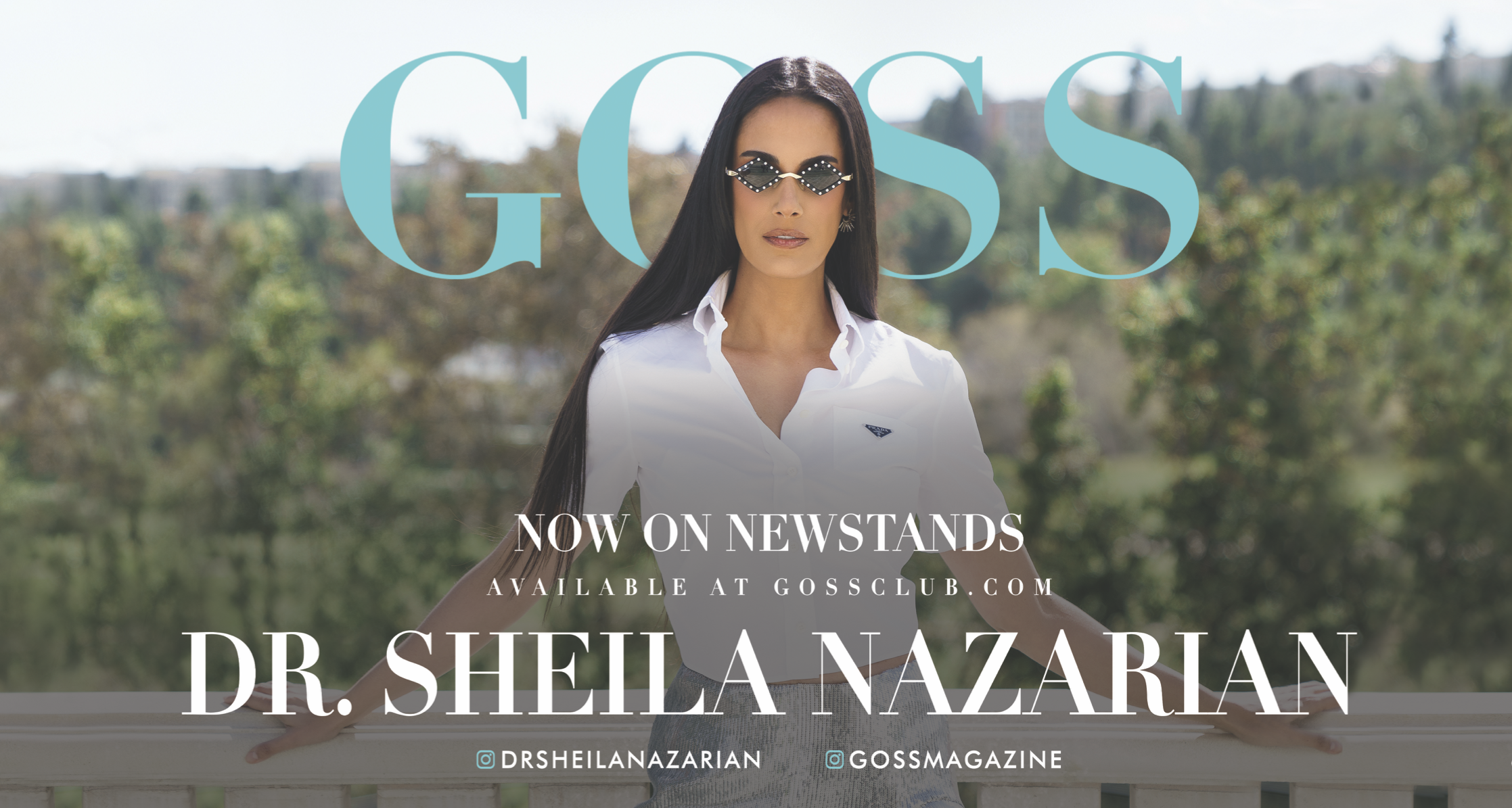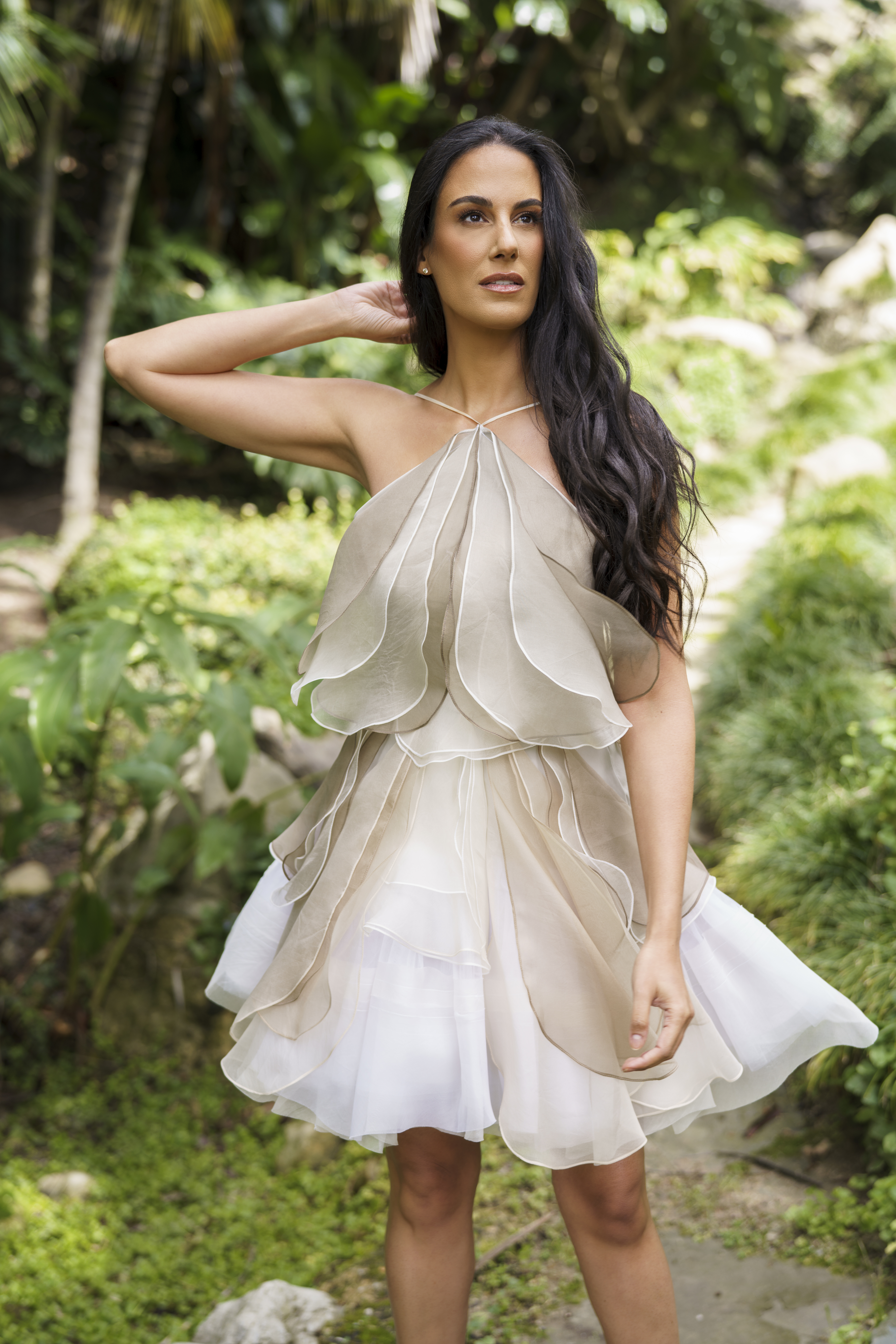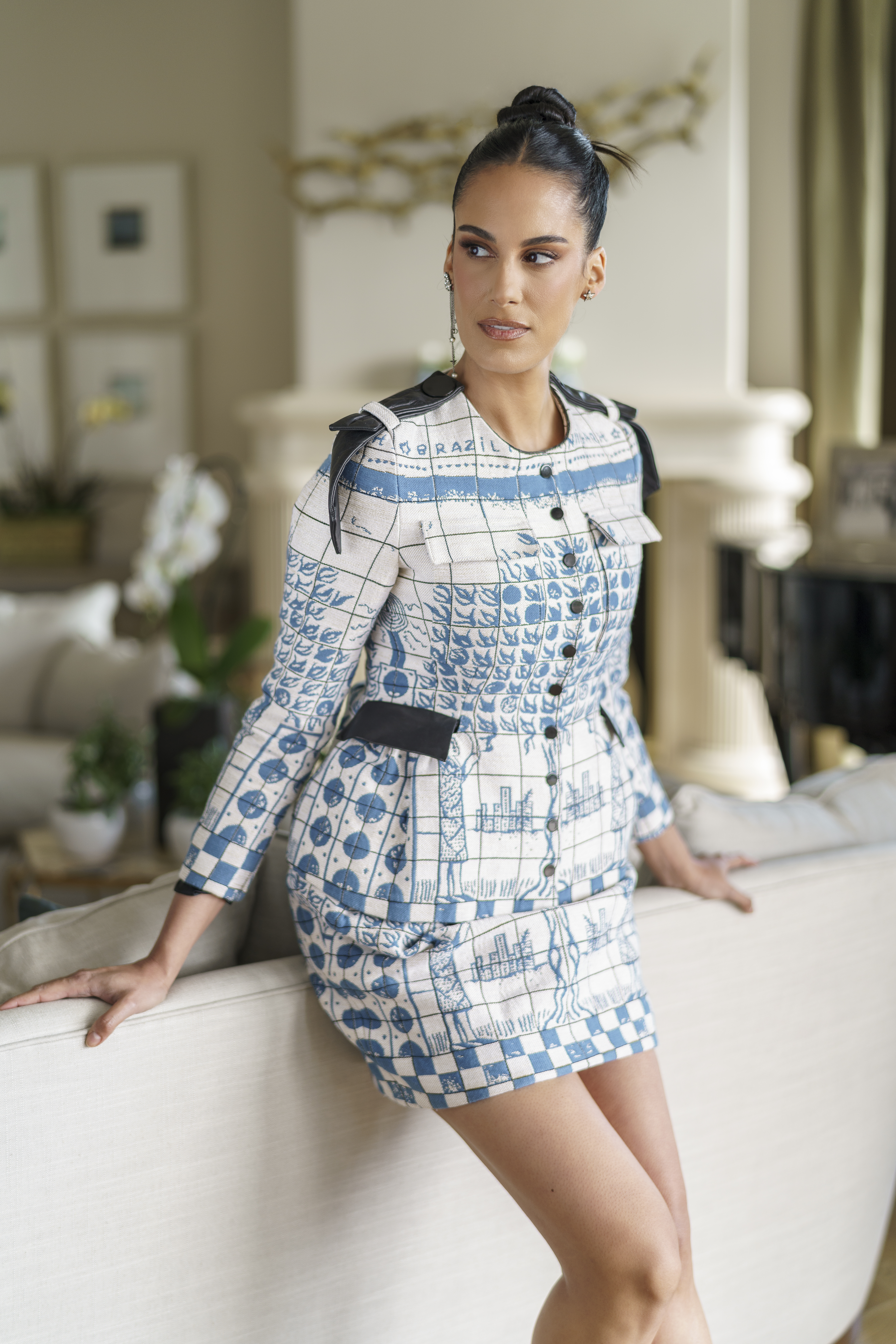
COVER | Dr Sheila Nazarian Women In Medicine
Dr Sheila Nazarian | Cover Story
On thinking BIG, Fighting anti-semitism while using her 1M+ following for change, and empowering women worldwide
Introducing the one and only, Dr Sheila Nazarian. Known worldwide as an award winning plastic surgeon, Sheila Nazarian holds many passions and titles. She is an MD, MMM is a Board Certified Plastic Surgeon and the Founder of Nazarian Plastic Surgery and Spa26 in Beverly Hills. She serves as Assistant Professor at the University of Southern California, where she enjoys teaching the next generation of plastic surgeons.
Dr. Nazarian is also frequently published and invited to speak internationally on some of the biggest stages on topics that range from medicine to innovation. She is the Founder of the Non-Profit Organization called The Nazarian Institute, which helps connect and educate her colleagues on how to further their professional and personal lives.
Additionally, she created TheSkinSpot.com, a curated collection of online medical-grade skincare made affordable and understandable. Married to her soulmate of over twenty years, a mother to three beautiful children, she enjoys being an influencer in the aesthetic and digital space: @drsheilanazarian on Instagram and Nazarian Plastic Surgery on Facebook. Talk about a woman who does it all and continuously breaks barriers!

Tell us more about your story, and where you came from.
I’m an Iranian Jewish immigrant, my family escaped through the desert over to Pakistan from Iran in 1985/1986. We were in Pakistan for three months waiting for our visas to come through and finally reunited with my father in Vienna. He left saying he was going to a medical conference and left our passports with the government. My mom, my sister, and I escaped through the desert. He waited for us in Vienna. After three months we reunited with him. We were in Vienna for about a month and then came over to the US. I was an anchor baby, my mom came to the US when she was nine months pregnant. So I was the only citizen. We lived in New York first and then came to California. Both sides of my family, my mother’s and my father’s side, are split between New York and LA. We stayed with family for a while. My father was a pathologist, he’d done his residency at the University of Pennsylvania. He would ride his bike to the library every morning to study, try to pass the board so he could start working and we could eventually stand on our own two feet. Then we lived in Beverly Hills.
I went to the Beverly Hills public school district. We moved around a few times from an apartment to a house. Over time, my father started to work and eventually landed a job in a very prestigious private school. I didn’t even know what private schools were. All my friends left in the seventh grade and I was like, “Where are you going?” And they were like, “Private school.” I was like, “What’s that?” I applied in the eighth grade when they were accepting five people and I got in. And that was amazing. That high school prepared me for life. It was very difficult. It taught me how to manage time. It taught me how to multitask. It taught me to reach higher than I thought I could reach. So I applied early decision to Columbia University in New York and I got in. Columbia was much easier than high school. And then I went to Albert Einstein College of Medicine in the Bronx. I got accepted to a combined plastic surgery program at the University of Southern California. Between my three years of general surgery and three years of plastic surgery, I also got an MMM, which is a master’s in medical management at the Marshall School of Business. It’s almost like a business school for doctors.

I got married my second month into the internship and had three children during residency. I came out, hung a shingle, and started my own practice. My husband and I shared an office for the first three years. I very quickly knew what I had to do in order to become successful. I knew I wanted my own TV show ever since residency. I did a lot of theater and dance all throughout my life, so I just knew. Also, I love to make an impression on the masses. I think it’s special to do a one-on-one relationship. One surgery at a time or one patient at a time can be very gratifying, but to me personally, it just wasn’t enough. I needed to be able to educate the masses. I got on social media very quickly. I was one of the first plastic surgeons to make videos. It helped with my search engine optimization. It helped with my business. I got a lot of hate from my colleagues, initially. Once the show came out and gave the appearance that plastic surgery wasn’t a circus or a shit show, and it really elevated the industry as a whole, then I started to gain acceptance from my colleagues. They were like, “Okay, she’s okay.”
Now, I’m close to almost ten years out of residency, I’ve been in practice for 10 years. And I have an e-commerce site called theskinspot.com which curates medical-grade skincare and wellness products that I have to put my stamp of approval on. That’s been an amazing language to learn, the language of E-commerce. I have a spa called Spa26. As you know, 26 holds a very special meaning for Jews, and so, everything I do is 26. So, Spa26 and plastic surgery are my biggest businesses. And then I also have a nonprofit called The Nazarian Institute, where we do business, branding, and personal growth education for healthcare providers. And really, it’s good for everyone, but you’ve got to niche yourself out in that nonprofit space. I’ve surrounded myself with amazing staff and amazing support.

Have you had any mentors throughout your journey in medicine?
I feel like all my mentors were in plastic surgery. They were men, and they were great mentors to me. The women that I knew were trying to look like men or behave like men and were like, “I’m a surgeon and I have to look rough,” very masculine energy. And that was another reason why I got a lot of hate. I knew Instagram was about inspirational messages, but beautiful pictures. I was doing a lot of gowns and a lot of vacation photos. Initially, people were like, “Oh, she doesn’t even operate, she just takes pictures all day.” But they didn’t know I was banging out like 40 outfits in one day, making 120 videos, and that was my content for the whole month. So there was a lot of hate. And it was funny because there was a vascular surgery article that was talking about ethics in surgery and ethics among surgeons. And they mentioned in that article that female surgeons in bikinis like those photos on Instagram were unethical. And so, there was this huge movement among female surgeons to post themselves in their bikinis. They were saying, “Oh, we stand in solidarity with our vascular surgery colleagues,” or whatever, but those were the same surgeons that were talking shit about me when I was posting my pictures of my bikinis before this article came out.
So, I think things are changing. I think things are getting better. I think there’s definitely acceptance. But honestly, I’m the type of person that blazes my own trail. I’ve come to realize that I’ve always been that way. I think as a Persian Jewish girl, you want to be patted on the head and said, “Oh, you’re such a good girl. Oh, straight A’s, we knew you could do it.” You always want to hear those words of affirmation from others. But I think I got to a certain point where I was like, I’m not like the others and I know what it’s going to take for me to shine my brightest, so I’m just going to go with that and I’m not going to stop doing what I know will make me successful and what I know is going to make me feel I’m fully fulfilled and that I’m on the path to my ultimate purpose because it pisses other people off. Those people are just waiting for me to fuck up, or they’re just waiting for me to fall flat on my face. Why do I care what they say about me when they’re waiting for me to fail? They don’t even love me. Why do I care?

At what point in your journey did you stop caring about what others think about you?
I think I’ve always been that way, but I didn’t really feel comfortable in it. I’ve always been the person that, if somebody did something wrong, even if it was my teacher, I’d be like, no, that’s not okay. And I think I started going in that direction when I hit 30, I had two kids by then. In the Persian community, especially in LA, you do care. Because it might affect who your kids marry or it might affect what party you’re invited to. But, I don’t care. I have a podcast called The Closet, that’s why I’m in my closet — because this is where I film it. Honestly, I love fashion, I love jewelry, love self-expression, and all of that. I wasn’t always that way. When I got engaged, I didn’t even own one dress. I owned no dresses. I literally had to go with my aunt and buy 12 dresses in three days, because you know how many parties we Persians have.
At this point in my life, I feel like my jewelry is my education and my talent. It’s all inside. I love fashion, I love wearing that stuff, but that’s not where my confidence comes from. I went through imposter syndrome. I remember I got accepted into Gifted & Talented Education and I was like, oh my God, they’re going to figure me out, I don’t belong here. Or when I got accepted to that high school I was telling you about, the private school, I was like, oh, my God, they’re going to say they made a mistake. So, I went through that. But then at a certain point, you’re like, wait a second, this guy is saying he’s the world’s gift to this, and I see my results, and if he’s saying that, you know what I mean? A lot of it is just smoke and mirrors and fake it till you make it. And these people that are claiming to be the best and world’s gift, they’re so insecure, they’re so easily triggered. I think it’s just an experience thing, as you meet more people you see and hear.
How did you develop your business mindset?
I majored in Economics at Columbia. You weren’t allowed to major in just pre-med. You could be pre-med with a concentration in something and you had to major in something else. Back then I didn’t know I was going to be an entrepreneur. I didn’t have any mentors. I didn’t understand the stock market. I didn’t really understand that stuff. But I liked economics because it was easy to get an A and I could get into medical school. It’s kind of like a psychology class. It’s a lot of human behavior and reading the room. I was intrigued by that aspect of it. And then when I did business school, we had accounting and profit and loss statements, which are really useful but super boring to learn. But we had marketing, how to write a business plan, and we had to give presentations. The presentations were up my alley with the previous theater that I was involved in. And marketing is also psychology, it’s also understanding the room and it’s understanding your ideal customer.
I got all of that. And I think a lot of physicians don’t get that. Two years out of school — and just to give you an idea, there are 31 plastic surgeons just in my building, much less all of Beverly Hills — I was on the first page of Google if you searched Beverly Hills Plastic Surgeon. Because I was making the videos and I was posting them to YouTube. Google owns YouTube. I got so many press opportunities. I got so many TV interviews. When you search for something, you get that line of videos from YouTube. I was the only one making videos. Everybody was always asking me, “Who’s your publicist?” I was like, “Me.” It was kind of like luck but also understanding how people like to consume information. People don’t want to read. Nobody cares about your website. They just want to watch a quick video, and if they’re really interested, then they’ll go read later. So, it was just understanding people.
What advice would you give to your younger self?
Don’t be afraid to ask for help. Because I felt that asking for help was a sign of weakness and showing people that you can’t do it. And now, all I do is delegate and ask for help, and call friends, and call people that have been doing something longer than I have and ask for their advice, or look it up or read a book. That was not the younger me. The younger me was like, “I gotta do this by myself or I’m a failure.” And it wasn’t about reality, it was just my naivety.
I have one older sister, she’s a podiatrist, and she’s in New York, with five kids. She’s six years older so we weren’t that close when we were younger. We had two cousins that were closer in age so we hung out more than I did with my own sister. Six years is a lot. A bit of advice to all the young women listening, I think two and a half to three years apart for kids is ideal. My first two girls are a year apart, so there’s some competition there. The third one is three years later. I think that gives your kids time to be babies and time to be toddlers and get your full attention. And they’re close enough in age that when you go to see a movie, they have the same interest in that movie. They’re not like a 10-year-old and a one-year-old, “I don’t want to go watch Peppa Pig.”
Photography by Lindy Lin
To read the full article, subscribe to Issue No 26 here.
Get your hands on the latest tips and tricks of what it means to be a #GOSS. In this free e-book you will dive into 11 business traits that will help you grow your business!
11 Ways To #BeGossy E-book
FREE DOWNLOAD
Find out more inspiring stories from women worldwide of all industries. Follow us on Instagram @GossMagazine.
website design Credit
© Goss Club Inc. 2024 | all rights reserved |
Inspiring & empowering women worldwide.
© GOSS CLUB INC. 2024 | all rights reserved
Share to: